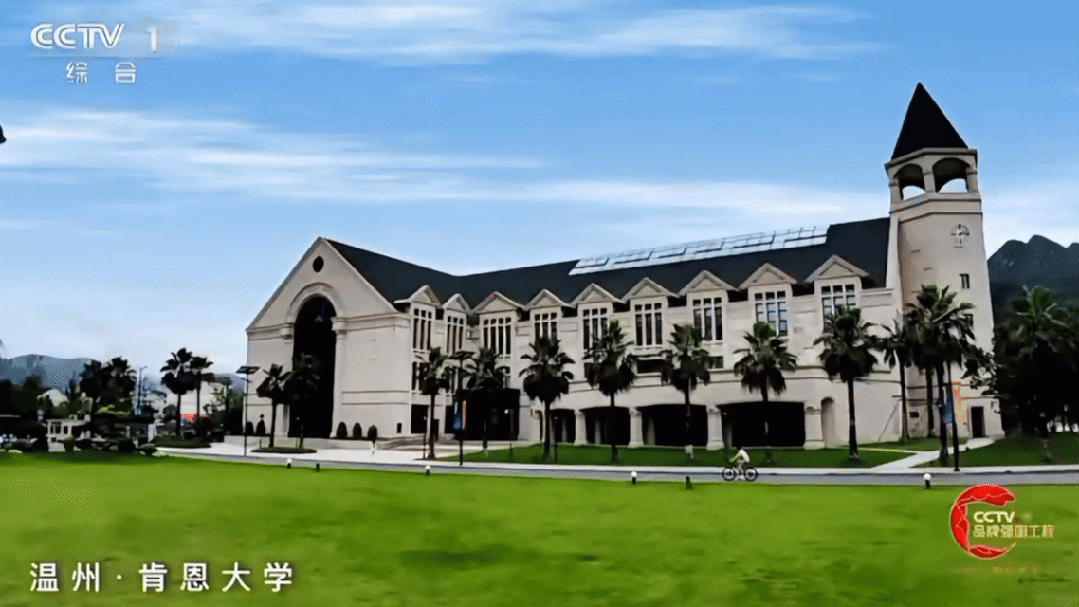The Mirror of Absurdity: Kafka and the Hidden Reflections of Modern Existence
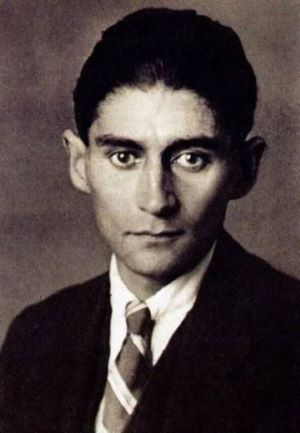
Franz Kafka(1883-1924)
(a German-language writer of the Austro-Hungarian Empire period, acclaimed as one of the most important literary figures of the 20th century)
Kafka was born in 1883 in Prague to a middle-class Jewish family. His father, a self-made businessman with a domineering personality, saw literature as a waste of time. Growing up under this oppressive shadow, Kafka spent his youth caught between his father’s harsh expectations and the loneliness of being an outsider-both as a Jew in Europe and a sensitive soul in a turbulent world. Forced to take a dull but stable insurance job, he poured his real self into writing late at night. Though plagued by physical illness, psychological anguish, and societal alienation throughout his life, he revealed the fundamental dilemmas of modern existence using restraint and clear words.
In his writings, people are trapped within inexplicable systems—judged, negated, and alienated by invisible rules, forced to apologize for crimes they never committed, their efforts to prove self-worth perpetually met with silence. It’s like he predicted our world today: multitudes now subsist in Kafkaesque absurdity, navigating an icy, illogical reality. It is this uncanny ability to distill the existential dilemmas of modern life that cemented his legacy as a literary seer who foretold reality.
Kafka's last wish demanded the destruction of all unpublished manuscripts and banned republications of existing works. Fortunately, his loyal friend Max Brod defied the request and was convinced that "the world needs these writings". Thanks to that act of defiance, we can now read 70% of work that should have been lost, hearing the nocturnal writer's warnings and echoes reverberating through the modern world.
If you have ever felt crushed by invisible forces, silenced when you tried to speak, or utterly alone, then open Kafka. He won't save you, but he understands. As he himself declared: "A book must be the axe for the frozen sea within us".

Part 1. The Lonely Cosmos: Kafka's Labyrinth of Letters ![]()
Truth is light, but humans can only endure its shadows.

Die Verwandlung
Call Number: PT2621.A26 K34 2023 v.1 CN
PT2621.A26 K34 1992
Die Verwandlung The castle
Call Number: PT2621.A26 K34 2010 CN
The Metamorphosis is one of Kafka's most famous novellas and the ideal entry point into his literary universe. It begins on a seemingly ordinary morning when Gregor Samsa awakens to find himself transformed into a gigantic insect. As the bedroom door repeatedly opens, he witnesses his own body decaying, while his family, once dependent on him, gradually withdraws into indifference and rejection upon losing his "economic value". With chilling calm, Kafka documents this nightmare no one dares confront. He levels no explicit accusations, yet through silent absurdity, readers feel the raw pain of being pushed aside by those who once needed them.
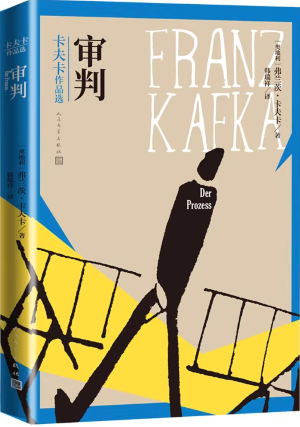
Der prozess
(Available in Chinese & English editions)
Call Number: PT2621.A26 K34 2023a CN
PT2621.A26 K34 2009b
On his thirtieth birthday, Josef K. was arrested without cause, yet never informed of his alleged crime. When he tries to defend himself, he finds that the entire judicial system is like a maze without an exit. Every corridor introduced new rules, and every chamber housed a different judge. Kafka wrote this while working on injury claims at an insurance company. This novel, with its excruciatingly precise depiction of bureaucratic procedures—from inaccessible court records to the paradox that "one must confess before being permitted to defend"—foretold the universal plight of modern individuals trapped within institutional machinery.

Das Schloss
(Available in Chinese & English editions)
Call Number: PT2621.A26 K34 2022a CN
PT2621.A26 K34 2009
K. trudged through the snow to the village, claiming to be the land surveyor hired by the Castle. Thus began his hopeless quest for the Castle stood within sight yet remained perpetually unreachable. Phones connect to the wrong extensions, and documents are circulated endlessly between offices. The labyrinthine bureaucracy ran like clockwork, yet no one could pinpoint where true authority resided. Worse than the distant Castle is the villagers' blind obedience to the system. Each of us, in our own way, is perpetually "surveying" that unreachable Castle, and in the process, becoming mere cogs within the machinery.
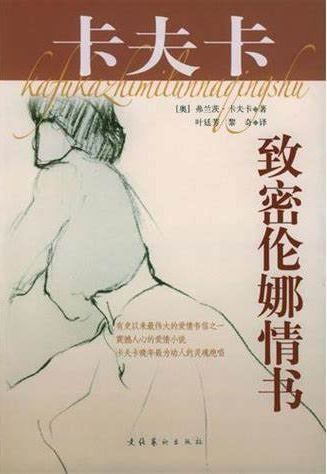
Briefe an Milena
Call Number: PT2621.A26 K34 2023b CN
PT2621.A26 K34 2009b
In 1920, the 37-year-old Kafka met Milena Jesenská, a 25-year-old Czech journalist, igniting in Prague a literary love destined to consume itself. Love letter written in German, witness a tuberculosis patient on the brink of despair transforming love into his ultimate literary redemption: "your letters are my oxygen mask". Unlike his meticulously crafted fiction, these unvarnished words reveal a rawer, more vulnerable Kafka. As he said, "Letters are the marks I carve in darkness with burning hands".

Franz Kafka : die Zeichnungen
Call Number: NC312.C93 K34 2023 CN
When you've read some of Kafka's fiction and yearn to know the man behind the words, this unique collection is your key. For the first time, it systematically presents Kafka's little-known visual works: 163 original sketches, doodles, and manuscript illustrations. These drawings are like shadows of his literary universe, their lines and ink strokes extending his world of paradoxes and nightmares. More than an art book, this is a spare key to Kafka's psyche. Where words fail, these drawings reveal: he didn't just write the absurdity, he drew the fractures in the modern soul.

Part 2 Through Others' Eyes: Unlocking Kafka's Multiverse ![]()

Gespräche mit Kafka Gustav Janouch
Call Number: PT2621.A26 J36 2023 CN
Kafka left no systematic theoretical works during his lifetime, yet his dialogues with friends, family, and contemporaries were preserved in several invaluable collections of recorded conversations. Stripping away the allegorical veils of his fiction, these texts reveal Kafka speaking in his own unmediated voice. Here emerges a figure even more paradoxical than his literary creations, at times incisive as his dictum "Truth is light, but humans can only endure its shadows", at others vulnerable in confessing "I am made of hesitation". For readers intimidated by his difficult works, these conversations offer a gentler introduction; for experienced readers, they serve as keys to understanding those puzzling texts.
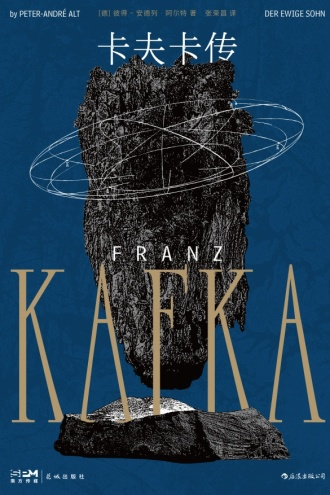
Franz Kafka : der ewige Sohn
Call Number: PT2621.A26 A48 2022 CN
When you've read Kafka's works, this book allows you to revisit his life from a fresh perspective. As noted in its pages: "Though Kafka's external and inner life successively inspired his writings, literature in turn delineated the trajectory of his life. Not uncommonly, Kafka prophetically articulated his own life circumstances through his fiction-or rather, he enacted literature in his lived experience".

Prozesse über Franz Kafka
Call Number: PT2621.A26 C36 2023 CN
Canetti's take on Kafka goes beyond typical literary criticism, but as a sharp-eyed doctor of modern life. He shows how Kafka’s stories didn’t just predict the nightmare of dictatorships also perfectly described the loneliness and self-doubt we all feel today, trapped between rigid bureaucracies, cold technology, and our fragile online identities. In his deep dive into Kafka’s texts, this Nobel Prize winner makes a chilling point: "We’re all our own worst judges, but when our own trial comes, we’re never in the courtroom".
*All the recommended books listed above have been shelved in the atrium on SLAC 3F. Readers are welcome to check them out.

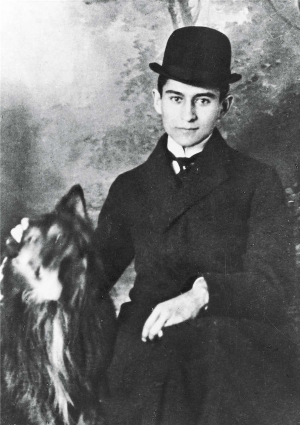
Reading Kafka for the first time can feel intimidating due to his writing style. But don’t give up. Begin with his short stories, take your time, then work your way up to his famous unfinished novels. Kafka's complexity isn't a barrier; it's the only way he could show us the uncomfortable truths about life, like how some illnesses only show up on blurry X-rays. He doesn’t give answers, but forces us to ask the big questions: Why do we follow senseless rules? What makes life meaningful? It’s as if he’s holding up a flashlight in a dark room-not to find the exit, but to make us really see the darkness. You don’t read Kafka to escape life’s absurdity, you read him to understand your own place in it.
Content | PENG Yuchang
Layout | PENG Yuchang
Review | HU Linxiao



